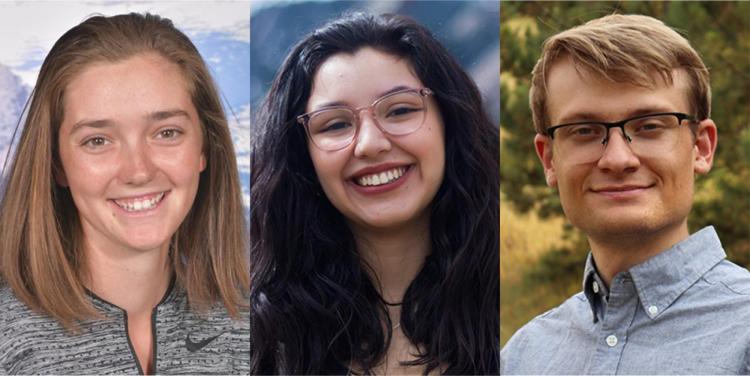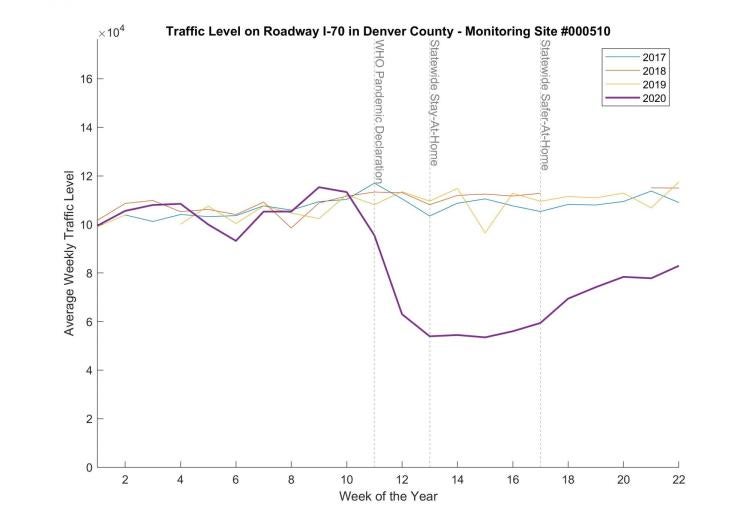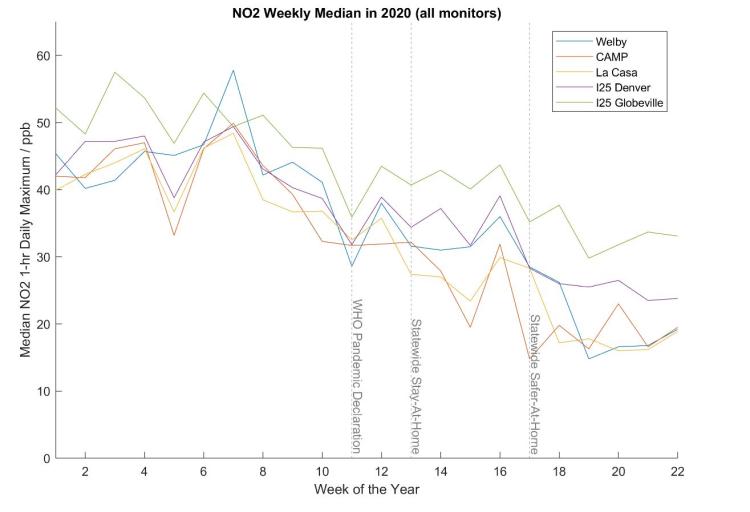The ME SPUR Experience: Hodgkins, Kirk and Pérez research air quality impacts of Stay-at-Home and Safer-at-Home orders

Mechanical engineering undergraduate researchers, Kirsty Hodgkins (left), Paula Pérez (center), and Evan Kirk (right).
The ME SPUR Program, modeled after CU Summer Program for Undergraduate Research, enabled undergraduate students to work with mechanical engineering faculty during summer 2020 on research that could be conducted remotely. As participants, Kirsty Hodgkins, Evan Kirk and Paula Pérez worked with Professor Jana Milford to understand how reduced traffic, telecommuting and reduced industrial activity during Colorado's Stay-at-Home and Safer-at-Home orders have affected air quality with goals that the project would inform future strategies for improving air quality in the region beyond the timeframe of the COVID-19 pandemic. Their summer research project was titled, Impacts of Colorado’s Stay-at-Home and Safer-at-Home Orders on Air Quality.
Hodgkins is a rising fifth-year mechanical engineering student with minors in business and engineering management and a current member of the CU Women’s golf team. She is not yet sure what field of mechanical engineering she would like to pursue after graduating. Kirk is a fourth-year mechanical engineering student with career interests including public health and medicine. After completing his undergraduate studies, he plans to attend medical school to pursue a career in family medicine. Pérez is a fourth-year mechanical engineering student with an energy engineering minor. She is focusing her career on water and energy insecurity in underserved communities, supported by experience in data analysis, rural development projects and entrepreneurship.
Hodgkins, Kirk and Pérez's insights below provide a window into their research experience with ME SPUR.
Describe your summer research.

A visualization of average daily traffic levels taken over a week-long period, comparing Denver I-70 traffic levels in 2020 to traffic levels in years prior. It highlights the a reduction in traffic following the WHO declaring COVID-19 a global pandemic and the Colorado Stay-at-Home declaration.

A time series that shows how nitrogren dioxide changed week by week across five monitors by calculating medians for each week. This visualization shows a downward trend for nitrogen dioxide, mainly caused by normal seasonal effects with some weeks increasing or decreasing across most monitors more sharply.
Our project focused on understanding the impacts of the COVID-19 Stay-at-Home and Safer-at-Home orders on air quality in Colorado.The purpose of the study is to report to policymakers and the general public about our research topic in ways that might inform future pollution control strategies. Our team focused on three pollutants: Ozone, NO2 and PM2.5. We were each responsible for studying one of these pollutants. The goal of the project was to determine if these pollutants experienced changes in 2020 and to try to explain the observed trends by analyzing traffic data, oil and gas activity and meteorological impacts.
Pérez: It was my first time working so closely with data on different social and environmental factors, which for me revealed how important our assumptions are in analyzing said factors and how the relationships between them are rarely straightforward.
What was the end result of your research project?
Overall, all of the pollutants saw small differences in 2020 when compared to previous years. We were unable to find that these discrepancies were necessarily correlated to the decrease in traffic levels, and further analysis of explanatory variables would need to be studied to understand why we didn’t see the expected pollutant behavior. Studying meteorological values we determined that the temperature and humidity levels had a large effect on the pollutant levels which could have counteracted the effects from traffic reduction. However, further research is needed to provide a definitive answer as to why levels were only slightly different.
What was it like working on a research project remotely?
Working on a project remotely is always a difficult task; this was no different. Someone described the COVID-19 situation as "more like living at work than it is working from home” which feels very relatable. It was difficult not always being able to meet or talk with the other members regularly as you would in an office, but a weekly Zoom meeting helped to make sure we were all on the same page, and we were still able to communicate over email and Slack continuously. The upside was the flexibility of working under our own schedule and knowing we could always reach out to the group with questions.
What about this project was rewarding?
The most rewarding part of this project was seeing the final results and creating the report for the study after going from basic knowledge of air pollution to having a fairly solid understanding of the problem. It is challenging to summarize the work that goes into research concisely, and after doing so many different graphs, looking at so many different variables, it all seems to blend into one. However, looking back over, it was really interesting to see the connections that had been made, and it was satisfying to see everyone’s work compiled into a final deliverable. It’s a particularly tangible way to see all of your hard work from the summer.
What advice would you share with other students considering getting involved in research?
Hodgkins: Research is definitely something every engineering student should be a part of, especially mechanical students. Definitely keep an open mind heading into it, as engineering students we’re very much used to having an answer or a solution to a problem but research isn’t always like that. Sometimes you just have to accept the fact that maybe there wasn’t a change in anything or that the results were insignificant. Even insignificant results can mean something.
Kirk: The recommendation I would make to students who are thinking about getting involved in research is simply to be patient. It is best to move slowly, working meticulously to ensure you are drawing reasonable conclusions and are not making mistakes. Take the time to double- and sometimes triple-check your work. You will be happy you did later.
Pérez: It is truly a great learning experience as you quickly gain hard skills as well as soft skills like collaborating with a team and communicating your findings. You will also likely gain more depth in your understanding of the research subject that you might not get in classes.

